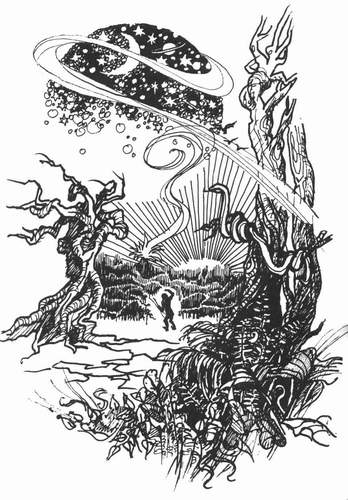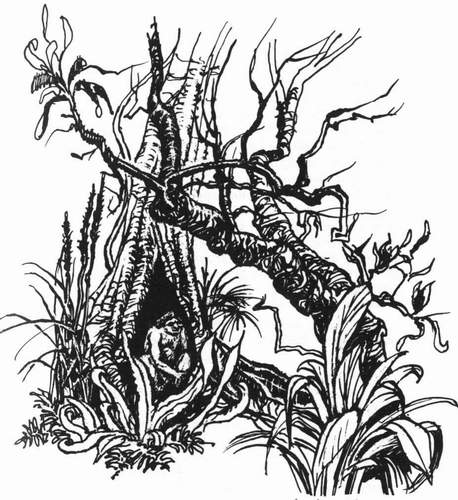
1 - Man Looks and Marvels

There is one thing above all others which sets mankind apart from every other living creature: his ability to wonder—and to worship.
Right from the beginning, he looked and marvelled at what he saw around him—even while he himself amounted to very little in a world dominated by animal monsters.
Way back in those early days, he seemed me least favoured of all the creatures on Earth. He was small and puny, he had no way of defending himself, and he had no home. He wandered hither and yon at the mercy of everything that could reach him—heat, cold, storms, earthquakes, huge meat-eating animals, and countless other threats to his survival.
Yet even then, he possessed one gift greater than those of all the other creatures put together: the gift of conscious thought—the ability to ask How and Why—and the ability to marvel at what he saw.
He would scramble up difficult cliff faces to escape from the dangers of the forests and the plains. He would perch up there on narrow ledges, feeling safe for a while—and he would look around at everything, and think.
He watched the sun as it rose above plains and mountain peaks in the early morning—as it travelled across the sky during the day, giving light and warmth, and finally as it sank out of sight again, leaving darkness and cold—and he wondered about it, and he marvelled at it.
He marvelled at the moon and the stars, at the wind and the rain. He feared the lightning and thunder, and the fires that sometimes raged through the mighty forests. He feared the earthquakes that sometimes tore open the ground beneath him, or sent whole mountains of earth and rock tumbling around him. And he feared those other mountains which sometimes gushed fire, and boiling lava, and death.
But even while he feared, he marvelled. And this was something quite new on Earth. None of its other creatures had ever marvelled before.
There was a feeling, in man, of his own smallness beside the greatness and power of many other things, like trees, rivers, hurricanes, fire, rain, mountains, the sun and the moon. And realising the greatness of these things, the spirit of man bowed down before them, and he began to worship. So, to begin with, man was a worshipper of Nature in its endless different forms.
But the sun and the moon, the trees and the rivers were the same for everyone, and as time went on, man the individual felt the need for a separate little god all to himself—to protect him and his family from harm. There was so much danger everywhere, so much need for protection.

One afternoon, long before the days of written history, a primitive man set out to hunt for food. He prowled through the forests for hours, but found nothing. Then it began to rain, and soon darkness fell, and he could not find his way back to where his family were waiting for him. He knew that the forest was full of dangers, but, as he was very tired, he decided to rest for a few minutes in the comfort and shelter of a hollow tree-trunk—and no sooner did he settle down than he fell asleep.
Hours passed, daylight came, and suddenly he was wakened by a shrill cry. It was only the cry of a bird perched on a branch just above him, but he leapt up in fright—and if he hadn't done so, he would most likely have been killed by a large snake that was just about to strike at him. Undoubtedly, he told himself, the bird had saved his life, and was his special guardian.
He hurried to tell his family about it, and they all agreed that, while the bird was near, no harm would come to them. But suppose it did not happen to be near at a time of danger ... what then? The father, or the mother, or perhaps one of the older children hit upon the excellent idea of carving a likeness of the bird out of a piece of wood or stone, and carrying this around with them wherever they went—one for each member of the family. Then, for certain, no harm could come to any of them. The bird had become their family god, and they began to worship it.
In the same way, other people revered the images of other things—frogs, beetles, grasshoppers, shells, crabs, and so on.
Our story of the man lost in the forest may or may not have happened exactly like that, but it gives the general idea of how idolatry began.
Then, of course, there followed something else, with people expecting their family gods not only to protect them, but also to harm their enemies. They started praying to them, demanding that they harm their enemies. And the enemies prayed to their own gods for the cruelest forms of revenge.
Naturally, there could be no joy in that kind of thinking or praying. Yet only a few among all the masses of humanity have ever truly realised this. And, down through the ages, these few have tried to enlighten their fellow men. They have taught that true and lasting happiness can be gained only by thinking kindly, living unselfishly—and by praying, not to carved and painted idols, but to the one Creator of all.
This is how the world's great religions began.
In western countries, so many people follow Christianity, that most of the other great religions are practically ignored: Islam, Hinduism, Buddhism, Confucianism, Taoism, Judaism. Not only do many of us feel that these belong in far-away countries and have nothing to do with us, but also—unfortunately— there is a tendency to believe that all of these other religions are 'wrong' because they are different from our own.
Nothing could be a greater mistake.
Just as we are all members of the one human family— whether we be Australian, Italian, Chinese, Russian, Indian, Japanese or Arabian—so all of the world's great religions are closely related to one another. We have only to look beneath their different names and forms, to make an exciting discovery—that they are all very much the same.
Though languages and customs differ, they are all aiming toward the same ideal—the highest ideal possible to the race of man—oneness with God ...
As we shall now see in the following pages, by reading the stories of the great religions one by one.